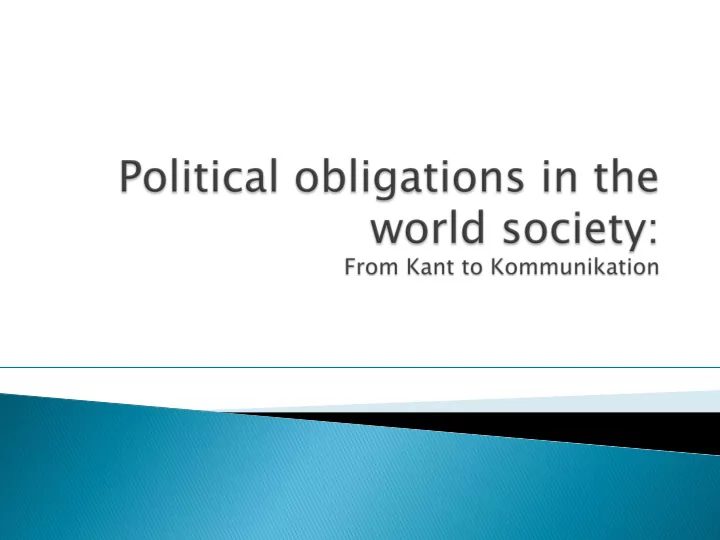

} Narrow – defeasible duty to obey the law (or comply with political authority, e.g. the state) ◦ Denial = ‘philosophical’ anarchism ◦ Affirmation (grounds, theories): fairness, justice, gratitude, consent, identity/membership, etc } Wider – what one ought to do as a citizen of a polity } Widest – what one ought politically to do
} Foundation: duty of respect/right of freedom } Argument: Rights cannot be respected (justice cannot be done) until all disputes about them are subject to compulsory adjudication and enforcement by credibly impartial institutions (at all levels of political organization).
Be a rightful person (honeste vive). Juridical honor 1. (honestas iuridica , rechtliche Ehrbarkeit) consists in asserting one's worth as a human being in relation to others, a duty expressed by the saying, "Do not make yourself a mere means for others but be at the same time an end for them." This duty is an obligation from the right of humanity in our own person (Lex iusti). Do not wrong anyone (neminem laede) , even if, to avoid 2. doing so, you should have to stop associating with others and shun all society (Lex iuridica). If you cannot help associating with others … Enter a society in which what belongs to each can be 3. secured to him against everyone else (suum cuique tribue) (Lex iustitiae) (Doctrine of Right , 6:236-7, trans. altered)
} ‘Cosmopolitan’ implication: rightfulness of state territorial claims only ‘provisional’ until all related disputes subject to compulsory adjudication. ◦ Ex. U.S.-Mexico War of 1846.]
} Political justification must rest on something that is ‘external’ or ‘prior’ or more ‘fundamental’ or ‘basic’ than the political (and perhaps even the social). ◦ e.g., ‘moral’ duties/principles, or ‘individual’ (self-)interest/utility.
} Philosophical anarchism, re: modern (CD) states: ◦ “The mere fact that an action is legally required or that a stable government holds power within a reasonably just state is insufficient to establish a moral presumption in favor of legal compliance.” (A.J. Simmons) } Philosophical skepticism, re: modern science: ◦ The mere fact that a belief is scientifically endorsed or that a recognized group of researchers investigates such matters within a reasonably epistemically favorable institution is insufficient to establish an epistemic presumption in favor of doxastic deference.
} Political practices, like scientific ones, are rational (if at all), not because they have a foundation but because they are self- correcting enterprises which can put any claim in jeopardy, though not all at once. i.e., institutionalize both challenge, critique and contestation (variation) and authority/defaults (selection, retention) (Cf. Wilfred Sellars, “Empiricism and the Philosophy of Mind”, §38)
} Social evolution = learning process } Material/instrumental & normative dimensions } Normative dimension ◦ Driven by expansion of open, public communication and argument in social process, including Range of topics Number and type/category of persons included Number of ways (forums, media, institutional roles) in which they are included ◦ Directional bias via structural features of speech Reversibility of speech roles: ‘I’/‘me’, ‘you’, ‘he/she/it’ Internal connection of meaning and justification
} Responsibility, not liability ◦ Parameters (reflect structural position of agent) Power/influence, privilege, interest, collective ability } Types of connection ◦ Causal ◦ Historical-genealogical (semantic, conceptual) ◦ Social-political (institutions, laws, rules) } Example: global apparel industry
March 25, 1911 145 dead Mostly immigrant girls
Rana Plaza, Dhaka, Bangladesh. April 24, 2013. 1132 dead.
}
}
} ‘ Garment industry wields power in Bangladesh’, NYT, 7.24.13
“In the honking, congested heart of this overcrowded capital, one glass office tower stands uniquely alone, surrounded by water, accessible by a small bridge. It is a symbol of the power of Bangladesh’s garment industry, the headquarters of the country’s most powerful association of factory owners. It is also illegal. So said the Bangladesh High Court, concluding that the land had been illegally obtained, the building had been erected without proper approvals and the location threatened a network of lakes that form the natural drainage system of the capital. The High Court called the building “a scam of abysmal proportions” and ordered it demolished within 90 days. That was two years ago. The building still stands.”
“Benetto tton Admits ts it t 'O 'Occasionally' ' Made Cloth thing at t Bangladesh Facto tory “, } Inte ternati tional Business Times , 05/01/2013 , 05/01/2013
} Usual ‘society’ concept too political ◦ ‘society’ has tended to mean ‘nation-state society’ ◦ ‘methodological nationalism’ (Ulrich Beck) } Fits statist bias of political obligation theory too well } Partly explains Kant’s hesitations: ◦ Voluntary confederation of states or federal world republic? Which ‘society’ is sufficient for our duty? ◦ (Note: my own position contentious re: Kant interpretation.)
} International system of states– IR realism ◦ No societal aspect at world level – ‘anarchy’ ◦ Rational action = instrumental } International society of states– English School ◦ Thin societal aspect – international values/norms ◦ Rational action = instrumental & normative (thin) } World society – Habermas/Luhmann ◦ Communication/meaning fundamental concept of social theory ◦ World level now only non-arbitrary point of application of unqualified society concept ◦ Every communicative event now reachable from every other Cf. Kant: ‘violation of rights in one place on the earth felt everywhere ’
Recommend
More recommend